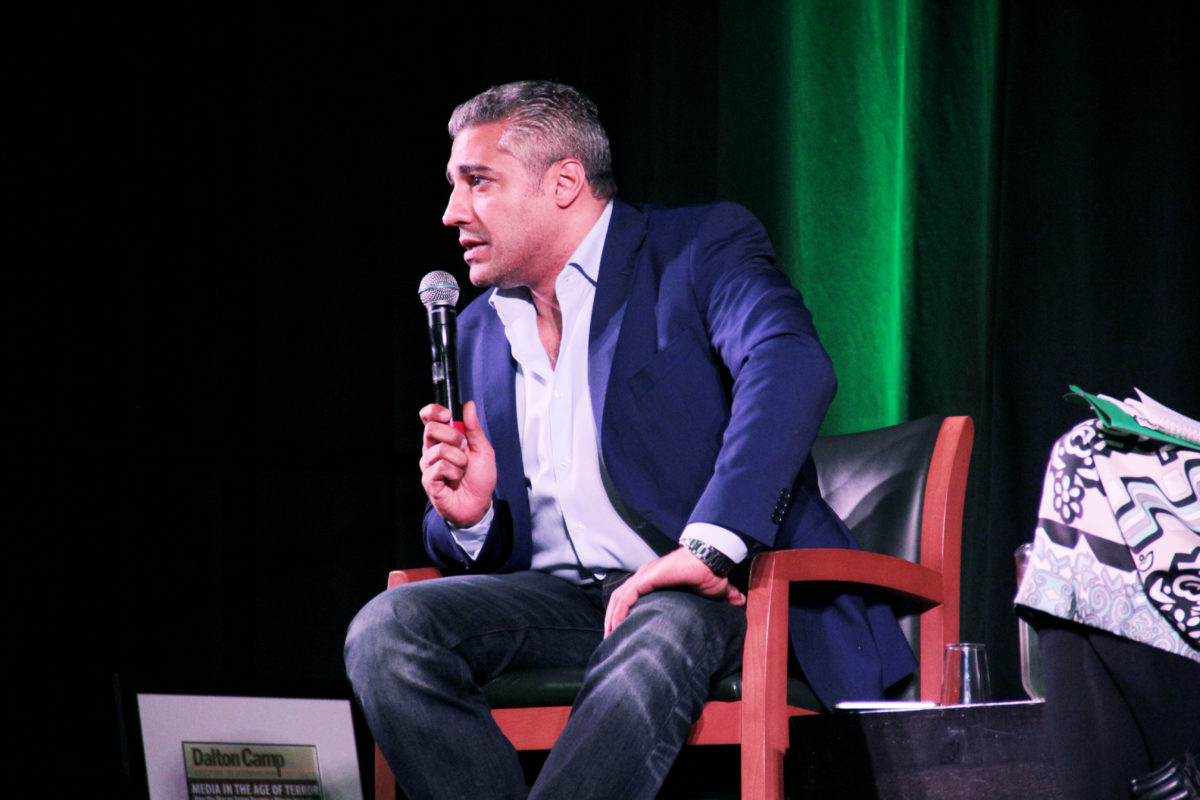This year’s Dalton Camp lecturer Mohamed Fahmy recalled a big moment in his first two months of being a free man: The November 2015 Paris attacks.
“Everybody was in tears, literally, everyone was still crying,” Fahmy said. “And I looked at the names of some of these people … some of the names and what they do. Artists, PhDs, a journalist, really intellectual people.
“I was really angry because I remembered faces and the conversations we had during the mock radio show inside the prison cell. And I remember how [the inmates] were joyful about journalists who were killed … I knew that they were probably celebrating the killing of these 130 innocent people.”
Fahmy, no stranger to the attacks like the ones in Paris, spent 438 days in an Egyptian prison after being accused of conspiring with terrorist groups and for fabricating news for Al Jazeera during his time as bureau chief for the Qatari network.
Fahmy, who was jailed along with two other journalists, conducted unrecorded interviews with members of groups like ISIS and Al Qaeda, gaining insight into modern terrorism. He and his fellow inmates would often host their own pretend radio show each night at 8 p.m. It allowed them to pass time and entertain themselves, but it was also an opportunity for him to get once-in-a-lifetime interviews.
“My colleagues and I decided to stay alive,” he told the crowd at the Richard J. Currie Center on Thursday night.
Fahmy said his time in prison taught him many things, but made him understand how human beings often underestimate themselves and their ability to survive.
“We don’t give ourselves enough credit for how strong we are,” Fahmy said. “I believe that we’re much stronger than we believe we are, and that’s what happened to me inside.”
Born in Egypt, Fahmy said his father brought his family to Canada because he craved the values typically present in a real democracy, such as freedom of expression and thought with no worries.
Now, as an award-winning journalist whose resume includes stints with CNN, the LA Times and BBC, Fahmy said he understands the freedom of expression’s importance as being “like oxygen.”
“Whether you are a journalist or a private citizen, you need to be free to say what you want, you can’t allow your privacy to be breached, and that’s something I’m very concerned about,” he said.
“That [is something] all governments are doing now in the name of the war of terror, but I do believe there should be a balance between the security approach and maintaining civil liberties. And that’s the biggest challenge for all governments across the world.”
Fahmy said much of the problem in conflict zones in achieving values like the freedom of expression is the lack of education among the people who live there.
“Can you implement democracy overnight? How can you convince them that democracy is good for them when they don’t have enough to eat at home?”
Fahmy said he explains these difficulties in his upcoming book, The Marriott Cell, and explains the different terrorist groups and ideologies through the eyes of the terrorists, his fellow inmates, themselves.
Much of what the book also portrays, he said, is the back story of how reporters cover such events as the Arab Spring, journalistic ethics and examples of how they were breached by Al Jazeera and lead to his detainment.
“It reminded me again of how important the job we do [is] and I think that you cannot cross the line with the ethics of journalism because I believe the network did that in certain cases … the network needs to be held accountable as well.”
Fahmy said his experiences in Scorpion Prison, one of the most notorious prisons in the Middle East, never made him think twice about his career. He said “what we do is extremely important,” and plays an essential role in “maintaining what it means to have a free press.”
As the war on terror continues to become a war on journalism as well, Fahmy said he doesn’t believe these attacks deter journalists. In fact, he said it’s the opposite.
In working with the government to establish laws to protect Canadians detained overseas and setting up his own foundation to help do so, Fahmy told the audience he will continue to advocate for the innocent Canadians and journalists detained overseas.
“I just believe that when someone goes through such an experience, it’s important for them to raise awareness. Because it could happen to any Canadian travelling abroad,” he said.
“The big challenge is yes, we are living in an age of terrorism, we do have to come up with laws to deter these terrorists, but we can’t lose our very important civil liberties. That’s what makes a good leader, striking that balance to keep it going as a functional democracy, a functional country that everybody looks up to.”

